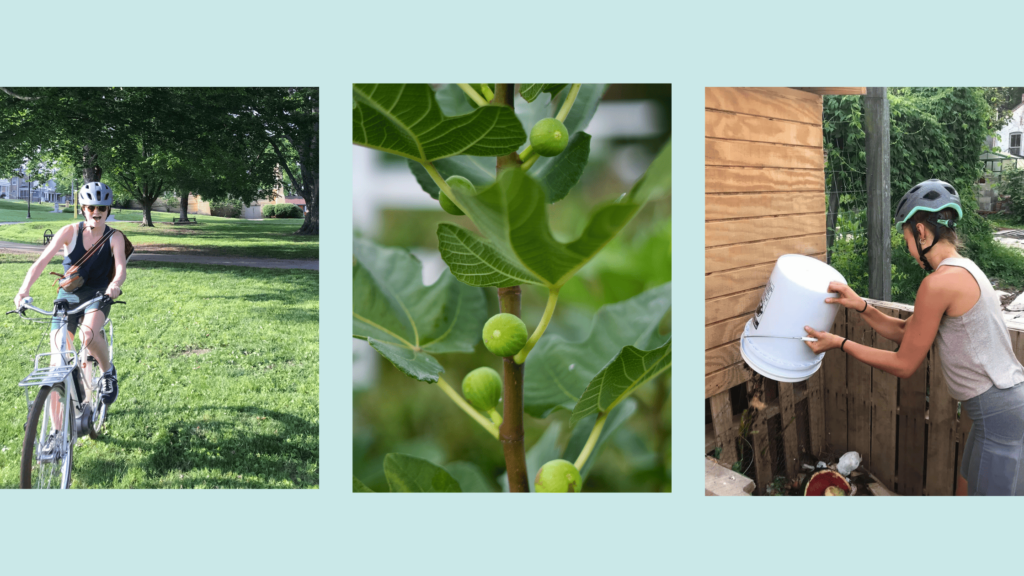Connecting with Nature is Fundamental to Wellness
We have an inextricable relationship with the natural world and our responsibility to safeguard the planet and its inhabitants. In the long run, we can only be as healthy as our planet.
Here, at Kingdom Health & Wellness, we understand that our connection with nature is fundamental. And, as with all of our functional medicine pathways, we draw on established research as well as ancient wisdom to support whole-body health. For example, Ecotherapy, which is a synthesis of ecopsychology and psychotherapy, uses nature-based interventions to promote physical and emotional wellbeing. Research in this field has demonstrated that cortisol levels may decrease by twice the threshold, pain levels may be alleviated by fourfold, and blood pressure may be lowered. Our connection with the Earth is essential to personal and relational wellness—wherever we live.
We value this principle in all of our programs. When we teach Food As Medicine, we discuss the importance of a high quality plant-based diet to promote wellness. While our healing pathways stress the importance of self-care, self-awareness, and group support to bring presence and connection to ourselves and the world around us; we also stress how big of an impact our environment is as well!
As we celebrate Earth Day, let it remind us to take a mindful pause to put ourself in the present moment, encourage us to tend to gardens, walk in our neighborhood, observe the new Spring blooms, and sit outside and practice a few minutes of gentle breathing. Enjoy the opportunity to be in sync with the natural rhythms of nature and the body. We honor, appreciate, and care for the Earth—as the Earth cares for us!
A Healthy Planet Means A Healthy Life
On every Continent we hear heart-breaking stories of people struggling with erratic climate patterns including floods, fires and cyclones. Thankfully, the population is recognizing that our actions have reactions. And, through more conscious and restrained choices when it comes to food, consumer goods and travel, we can influence our environment in a positive way rather than a negative way!
What is less reported but equally threatening is the direct impact that environmental degradation has on every cell in our body. With over 80,000 unregulated toxins unleashed into our environment in such a short period (there were no chemicals in use 500 years ago), we can begin to understand how this impacts on humans who have not evolved to handle such a burden.
Chronic illness on the rise due to environmental toxins
Many integrative practitioners around the globe are reporting an increase in chronic diseases as a direct result of environmental toxins. A new term describes these illnesses as ‘environmental diseases’ – illness which is caused by chronic exposure to toxic environmental chemicals.
In past generations, there were only a handful of people who struggled with allergies and chronic illnesses driven by exposure to toxins. These were the “sensitive” people who did not detox well. But now, with over 50% of both children and adults struggling with chronic illness, it is clear that even healthy people are not able to manage the wide variety of toxins in our extremely toxic environment. There are more people becoming ill with a wide range of ‘environmental illnesses.’
What are some of these ‘environmental illnesses?’
There are a wide range of toxins affecting the earth. Here is a list of some of the illnesses which can result from chronic exposure to them:
- Asthma – there’s a lot of pollutants in the earth’s air these days including vehicle exhaust, chemicals, mould and other toxins. People often have allergic reactions to these toxins and this can be an asthmatic reaction. There’s currently a global epidemic of asthma especially amongst children. For example, 50% of the people in the US have some form of asthma and this figure is on the rise (see study here).
- Cancer – Man-made chemicals including asbestos, PFOA, PFAS, VOCs and alcohol have been shown to cause some types of cancer in some people. Glyphosate used in herbicide has been found to cause Non-Hodgkin’s lymphoma by a California court (see report here). Cancer is the second leading cause of death in the US, causing more than 500,000 deaths each year.
- Mercury poisoning –people usually get mercury exposure from eating contaminated fish or from amalgam fillings which are still being used by dentists in some areas. The issue is the human body cannot get rid of mercury so it gradually builds up inside the tissues. If it is not treated, mercury poisoning can eventually cause pain, numbness, weak muscles, loss of vision, paralysis and even death.
- Lead poisoning – we ingest lead either by breathing in fumes from lead paint or lead dust – or by drinking water contaminated with lead. Lead can damage the brain, kidneys, liver and other organs. Severe lead poisoning can produce headaches, cramps, convulsions and even death. Lead is found in mother’s milk as it’s stored for decades in the mother’s bones and released like calcium when breast-feeding (not a reason to stop breastfeeding but a good one to detox before getting pregnant). See more info here.
- Mold Illness or Chronic Inflammatory Response Syndrome (CIRS) – this illness is sometimes caused when a person breathes in mould from a building which is contaminated by mould. Often the mould combines with other toxic chemicals in the building materials and this creates a ‘super toxin’ which can cause extreme symptoms including inflamed joints, depression and anxiety, neurological problems and gut sensitivity.
- Immune System Deficiency – chemicals known as PFAS have been used in industries worldwide since the 1950s and have been shown to harm the immune system. PFAS are found in our water systems, the soil, some packaging and some non-stick cookware. These chemicals have been found to cause damage to the liver and the immune system, as well as birth defects in newborns (see info here).
Take the time to care about our Earth
Earth Day offers all of us an important opportunity to take action and make lifelong resolutions that will benefit our children and our children’s children. Together we can work to prevent environmental destruction and nurture our ourselves and our planet back to an original state of vitality and abundance.
As Dr Mark Hyman says in his book, Food Fix – Transforming Our Food System for Planet & Human Health – ‘The epidemic in chronic illness will be cured on the farm, in the store, in the kitchen, in our schools, not in the doctor’s office.’
Here are our Top Tips for helping your health while also nurturing our planet.
1. Buy from producers who care – find local producers or look for organic and/or terms that reflect these values in food, paper products, hygiene products, cosmetics, cleaning products, bedding, furniture and clothing.
2. Shop local – for anything and everything – less fuel and energy used in transport, fresher and supports your local community (economic health translates to human health).
3. Work with an integrative practitioner – who supports your body’s evolutionary needs and also supports planet health because they see the correlation and affect it has on all human health.
4. Reduce, Reuse, Recycle – a time tested program. When you shop at thrift shops you are reducing your footprint by finding another way to gather your clothing and furnishings and not buying new items which are produced in energy intensive ways which often harm the earth.
5. Create your own organic veggie and herb garden – healthy soil sequesters carbon, supports vital ecosystems, grows nutrient rich plants and keeps the earth healthy. Dr Mark Hyman, author of Food Fix is getting the word out– ‘Our food system as a whole is the number one solution to climate change.’
6. Source meat from a regenerative farmer who practices “carbon farming” by managing cattle grazing (sheep and goats too) to produce nitrogen-rich soil which sequesters more carbon (and without toxins from industrial fertiliser or pesticides). The pure and rich soil this promotes also translates to nutrient rich and non-toxic meat… no plastic in our meat please!
7. Work with your neighborhood to use alternatives to toxic herbicides, fertilizers and EMF pollution – for example, use ethernet connections and avoid 5G where possible.
8. Conserve water – the less water you use, the less runoff and wastewater will end up in the ocean. Catch rain water for your yard and garden; use filtered water, spring water, or well water to drink – try to avoid excess plastic when you can.
9. Be conscious of how you travel – walk, ride your bike or take public transport as much as possible. Plus, you can improve your petrol mileage by 0.6 per cent to three per cent by keeping your tires inflated to the proper pressure!
10. Give composting a try – Globally, we produce millions of tons of waste every year. Yet, only a small amount of our waste is composted and most ends up in landfill. A little known fact is that food waste is the third largest contributor to greenhouse emissions after the United States and China. So, if more of us composted our food waste, it would help curb climate change while providing remineralization in the soil AND great fertilizer for your plant, veggie and herb gardens.

